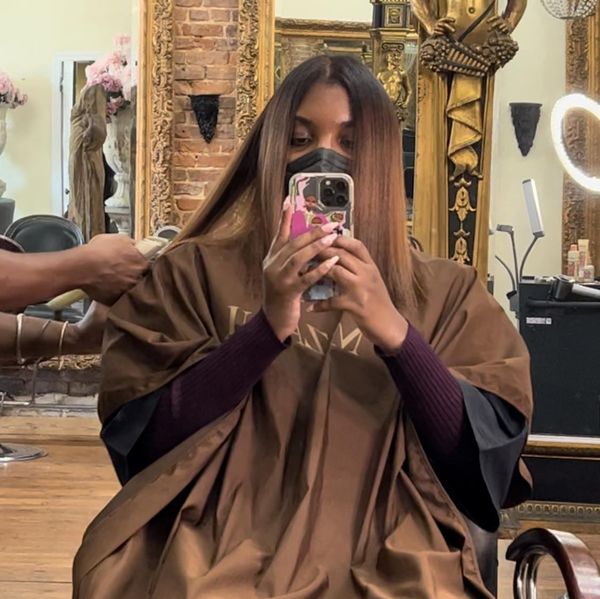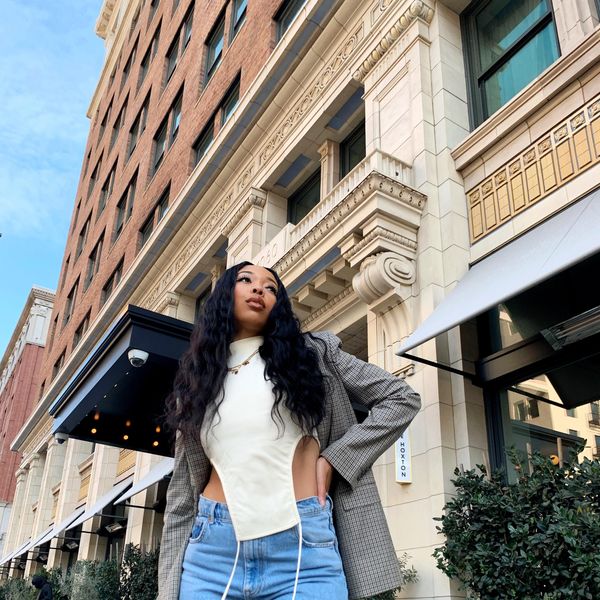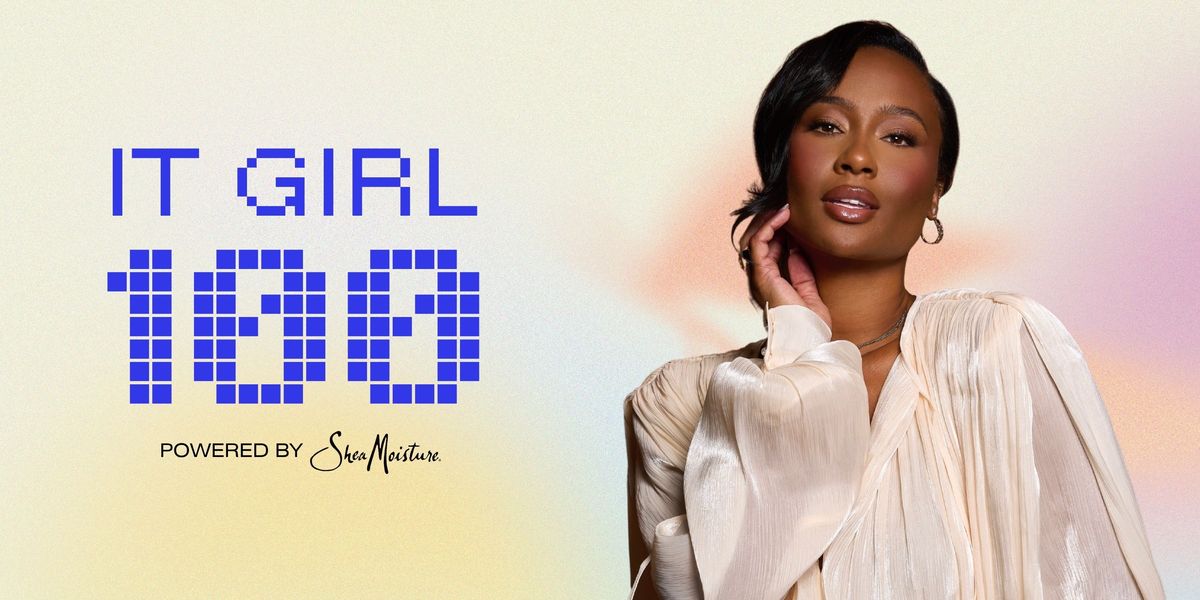Batana Oil Is What Your Skin & Hair Have Been Needing Since...Yesterday

If you’re someone who spends even a lil’ bit of time on TikTok (and you’ve got beauty content that shows up in your algorithm), you’ve probably seen at least one video this year that talks about how wonderful batana oil is — and it is.
One of the reasons why I’m so sold on it is — how many times do I have to say that long hair isn’t based on ethnicity? Speed of growth (meaning, whether your hair grows “1/2 or ¼” a month) tends to deal with genetics and the fact that some people’s hair produces more sebum that coats from scalp to tip more than others, that can result in less breakage which can lead to more length retention.
That said, still, whether you’ve got B-type hair or some level of 4, if long locks are what you are after, with some consistent nurturing and patience, you can have exactly what you desire — and batana oil just might be able to help you out…on a few levels.
Since banana oil is also an all-natural oil that can make your skin glow naturally, I wanted to take a moment or two to share with you why the next time you see a post about batana oil, you shouldn’t ignore it; invest in a bottle or jar and see why so many of us adore it just that much.
Batana Oil: What Is It?
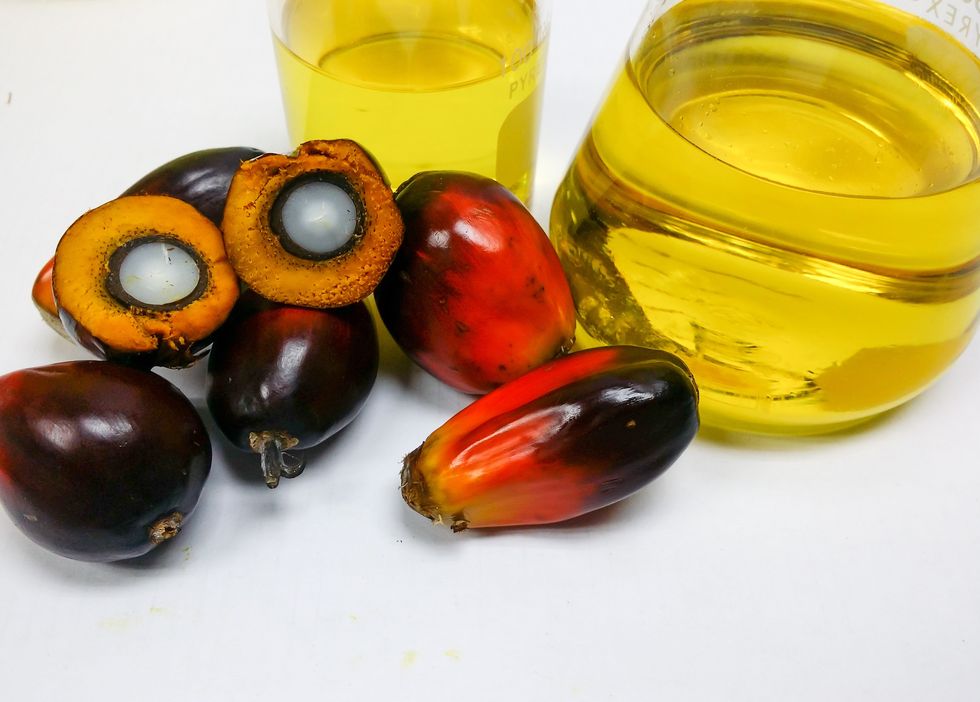
Getty Images
If you were to ask a group of Batana oil users what the oil smells like, most of them would probably say something like smoky coffee. Well, interestingly enough, the oil originates from nuts that come from a certain type of palm tree in Honduras. Although it’s thicker than, say, coconut oil, something that it has in common with it is the fact that it will solidify in cooler temperatures and melt into oil in warmer ones.
Anyway, a part of the reason why batana oil is becoming such a fan favorite within the Black community is because it is thicker and “richer” in its texture, that makes it a wonderful complement for hair textures that are curler or coarser. And since it’s also full of antioxidants, fatty acids, and vitamins A and E, it is something that can both restore and maintain the health of your skin as well as your hair.
And just how is it able to do this?
Batana Oil Benefits for Hair, Skin & More
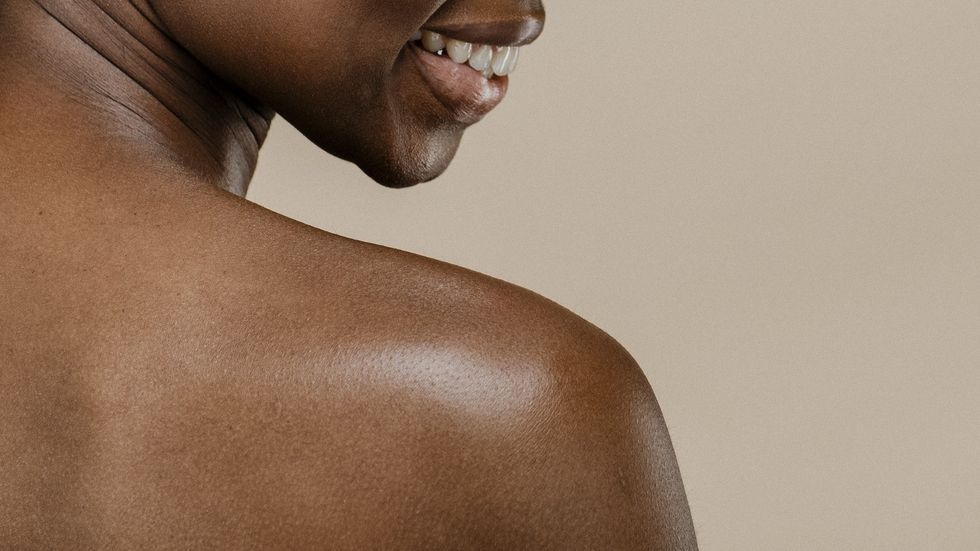
Getty Images
Batana Oil Benefits: Deeply Moisturizes Your Skin
One thing that batana oil is able to do is work as an emollient on your skin. What this basically means is it’s the kind of moisturizer that can help to hydrate and even soothe your skin. Another cool thing about emollients is they are automatically able to “seal your skin” with a protective layer of hydration.
So, if like me, you’re someone who likes to apply an oil to your skin after getting out of the bath or shower in order to maintain moisture for a longer period of time, batana oil is one of the best types of oil to apply.
Batana Oil Benefits: Fights Off Free Radicals
If, whenever you read a skincare article, it says something about free radicals and you’re wondering why you should even care about those, probably the quickest explanation that I can give you is they can cause oxidative stress, which can ultimately accelerate the aging process of your skin. So yes, you want to do all that you can to keep them “off of you.” Something that is able to do that? Yep, batana oil.
Because it contains the kind of antioxidants that help to keep UV damage from impacting your skin on a significant level, that is another reason to consider adding it to your skincare beauty regimen. Just make sure that you don’t substitute it for sunscreen. You will definitely need that as well.
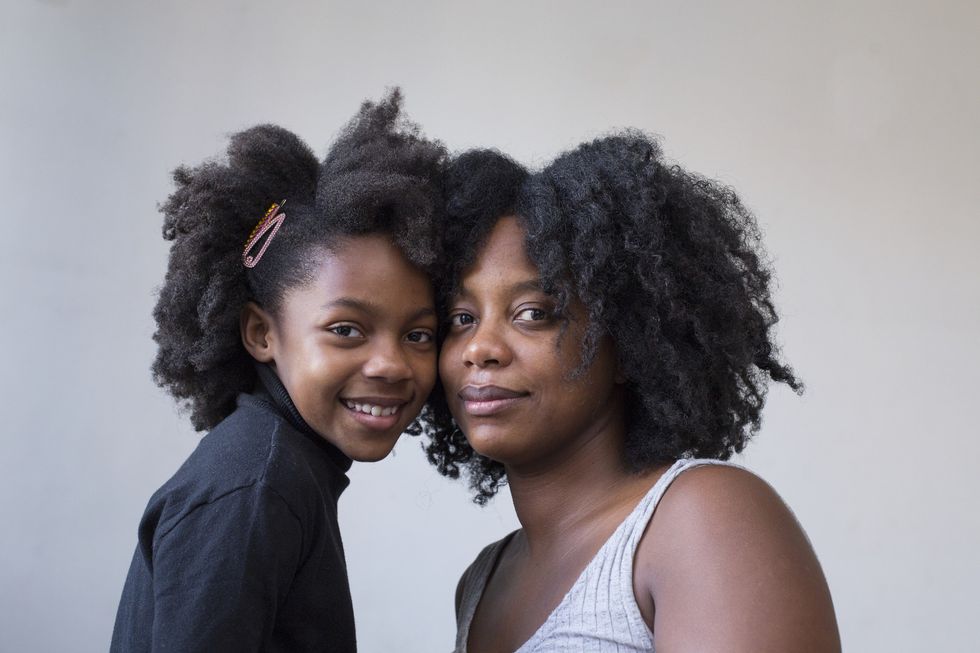
Getty Images
Batana Oil Benefits: Great for Scalp Health
Okay, so one of the things that turned me into a superfan of batana oil is how well it moisturizes my scalp. Dry scalp is something that I deal with pretty often, and since that not only can lead to itchiness and irritation, it can also have my hair looking dry and brittle, I want it to be lubricated on a consistent basis. Batana oil is able to do that, in part, thanks to the carotenoids that are in it.
Carotenoids are pigments that convert to vitamin A. This is great, as far as your scalp is concerned, because it helps your scalp to naturally produce sebum, protects your hair follicles, and ultimately encourages hair growth.
Indeed, a healthy scalp is the foundation for healthy hair (check out “Your Scalp Ages Six Times Faster Than Your Face. Why It Matters.,” “10 Things Your Scalp Has BEEN Waiting For You To Do” and “Treat Your Scalp To A Little Bit Of Detoxing This Weekend”).
Batana Oil Benefits: Helps to Prevent Hair Breakage and Reduces Frizz
As I already mentioned, something else that batana oil has in it is vitamin E. That makes it good for your skin because it contains anti-inflammatory properties along with compounds that help to protect and even repair your skin’s cells. As far as your hair goes, vitamin E increases blood circulation to your scalp so that your hair follicles are able to get even more of the nutrients that it needs (in order to improve the quality of your hair strands); plus, vitamin E add shine to your hair.
Also, since vitamin E can literally help to rebuild the structure of your hair too, that’s why many users say that batana oil has caused them to gain more inches as far as lock length is concerned. Oh, and since vitamin E also helps to smooth out hair cuticles (which is the result of hair dryness, too,) that can decrease the amount of frizz that you have, which can reduce breakage while defining your natural curls so much better in the process.
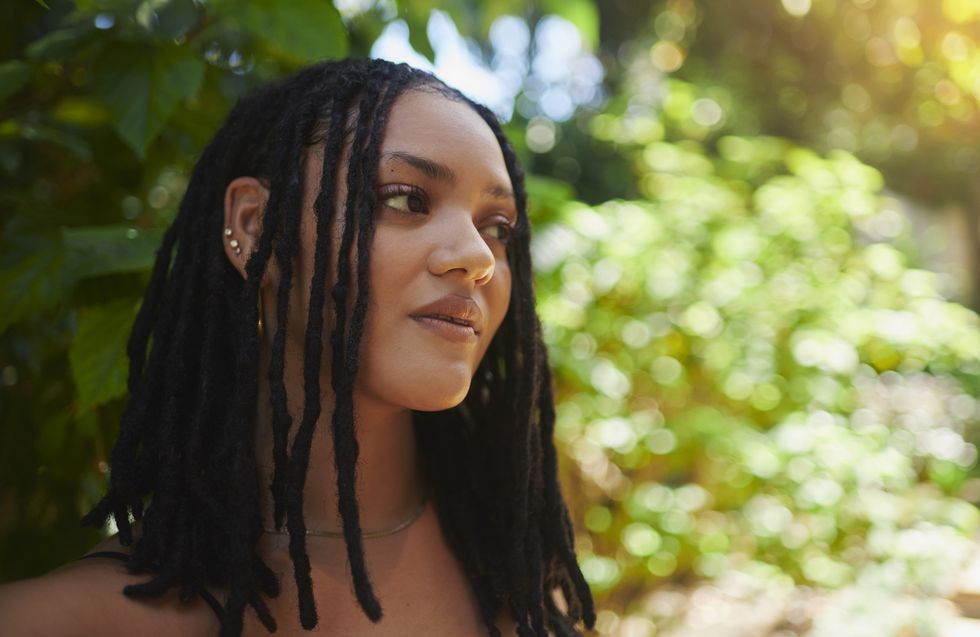
Getty Images
Batana Oil Benefits: Enhances Dark Hair Color Hues
Although batana oil cannot “dye” your hair (because it doesn’t contain deep pigments or chemicals), if you’re looking for an all-natural way to enhance the appearance of your dark hair, it may be able to do that too. Thanks to the dark tint that batana oil has (which is one way to test the integrity of the oil, by the way), it’s been known to bring about the best in darker hues — which will make the color look even richer thanks to the sheen that it also provides.
Batana Oil Benefits: It's an Excellent “Product Enhancement”
I’m someone who applies the oil to my scalp, straight out of the jar that I purchased it in. However, if you’re someone who wants to “ease into” the batana oil or you simply would like it to complement some of your other skin or hair products, it also works well in that way. Some people use it as an addition to their overnight skin moisturizer, pre-poo treatment on wash days, and/or as an additional ingredient in their leave-in conditioner or their hair mask recipes.
Also, if you’re on a mission to get some length retention, it absolutely cannot hurt to apply a bit of the oil to your ends before turning in at night (since your ends are the oldest parts of your hair).
BONUS: How to Know You’re Getting “Real” Batana Oil
Y’all know how it goes — when something magnificent makes its way onto the scene, there are going to be folks out here who try to scam you with a weak-ass imitation of it. Unfortunately, batana oil is no different. That’s why, I decided to close this out with a video from the YouTube channel Karen of Curl House (who has some pretty solid content, in general). If you watch it all the way to the end, you will get the intel that you know in order to feel confident about purchasing the kind of batana oil that will give you the best results of all. (Oh, and for the record, a Black-owned company that brands itself as selling 100 percent vegan batana oil is located here.)
___
There is a lot of stuff to choose from in these beauty-enhancing streets, no doubt about that. However, I can vouch that batana oil will not disappoint. Give it a shot (unless you have a nut allergy; it's made from nuts, after all). Your skin and hair will thank you abundantly, chile.
Let’s make things inbox official! Sign up for the xoNecole newsletter for love, wellness, career, and exclusive content delivered straight to your inbox.
Featured image by Peter Griffith/Getty Images
Exclusive: Viral It Girl Kayla Nicole Is Reclaiming The Mic—And The Narrative
It’s nice to have a podcast when you’re constantly trending online. One week after setting timelines ablaze on Halloween, Kayla Nicole released an episode of her Dear Media pop culture podcast, The Pre-Game, where she took listeners behind the scenes of her viral costume.
The 34-year-old had been torn between dressing up as Beyoncé or Toni Braxton, she says in the episode. She couldn’t decide which version of Bey she’d be, though. Two days before the holiday, she locked in her choice, filming a short recreation of Braxton’s “He Wasn’t Man Enough for Me” music video that has since garnered nearly 6.5M views on TikTok.
Kayla Nicole says she wore a dress that was once worn by Braxton herself for the Halloween costume. “It’s not a secret Toni is more on the petite side. I’m obsessed with all 5’2” of her,” she tells xoNecole via email. “But I’m 5’10'' and not missing any meals, honey, so to my surprise, when I got the dress and it actually fit, I knew it was destiny.”
The episode was the perfect way for the multihyphenate to take control of her own narrative. By addressing the viral moment on her own platform, she was able to stir the conversation and keep the focus on her adoration for Braxton, an artist she says she grew up listening to and who still makes her most-played playlist every year. Elsewhere, she likely would’ve received questions about whether or not the costume was a subliminal aimed at her ex-boyfriend and his pop star fiancée. “I think that people will try to project their own narratives, right?” she said, hinting at this in the episode. “But, for me personally – I think it’s very important to say this in this moment – I’m not in the business of tearing other women down. I’m in the business of celebrating them.”
Kayla Nicole is among xoNecole’s It Girl 100 Class of 2025, powered by SheaMoisture, recognized in the Viral Voices category for her work in media and the trends she sets on our timelines, all while prioritizing her own mental and physical health. As she puts it: “Yes, I’m curating conversations on my podcast The Pre-Game, and cultivating community with my wellness brand Tribe Therepē.”
Despite being the frequent topic of conversation online, Kayla Nicole says she’s learning to take advantage of her growing social media platform without becoming consumed by it. “I refuse to let the internet consume me. It’s supposed to be a resource and tool for connection, so if it becomes anything beyond that I will log out,” she says.
On The Pre-Game, which launched earlier this year, she has positioned herself as listeners “homegirl.” “There’s definitely a delicate dance between being genuine and oversharing, and I’ve had to learn that the hard way. Now I share from a place of reflection, not reaction,” she says. “If it can help someone feel seen or less alone, I’ll talk about it within reason. But I’ve certainly learned to protect parts of my life that I cherish most. I share what serves connection but doesn’t cost me peace.
"I refuse to let the internet consume me. It’s supposed to be a resource and tool for connection, so if it becomes anything beyond that I will log out."

Credit: Malcolm Roberson
Throughout each episode, she sips a cocktail and addresses trending topics (even when they involve herself). It’s a platform the Pepperdine University alumnus has been preparing to have since she graduated with a degree in broadcast journalism, with a concentration in political science.
“I just knew I was going to end up on a local news network at the head anchor table, breaking high speed chases, and tossing it to the weather girl,” she says. Instead, she ended up working as an assistant at TMZ before covering sports as a freelance reporter. (She’s said she didn’t work for ESPN, despite previous reports saying otherwise.) The Pre-Game combines her love for pop culture and sports in a way that once felt inaccessible to her in traditional media.
She’s not just a podcaster, though. When she’s not behind the mic, taking acting classes or making her New York Fashion Week debut, Kayla Nicole is also busy elevating her wellness brand Tribe Therepē, where she shares her workouts and the workout equipment that helps her look chic while staying fit. She says the brand will add apparel to its line up in early 2026.
“Tribe Therepē has evolved into exactly what I have always envisioned. A community of women who care about being fit not just for the aesthetic, but for their mental and emotional well-being too. It’s grounded. It’s feminine. It’s strong,” she says. “And honestly, it's a reflection of where I am in my life right now. I feel so damn good - mentally, emotionally, and physically. And I am grateful to be in a space where I can pour that love and light back into the community that continues to pour into me.”
Tap into the full It Girl 100 Class of 2025 and meet all the women changing game this year and beyond. See the full list here.
Featured image by Malcolm Roberson
This Is How To Keep 'Holiday Season Stress' From Infecting Your Relationship
Hmph. Maybe it’s just me, but it seems like there is something really weird happening in the fall season air (because winter doesn’t officially begin until December 21) that cuddle season is in full swing while break-up season is as well. In fact, did you know that break-ups are so popular during the holiday season that December 11 is deemed Break-Up Day?
The reasons why relationships shift around this time vary; however, I did both roll my eyes and chuckle when I read that a very popular one is because it’s an easy way to get out of getting one’s significant other a Christmas present. SMDH.
Anyway, I personally think that the less shallow folks out here may contemplate calling things “quits” or they at least distance themselves a bit from their partner (and what I’m referring to is serious relationships) due to all of the stress and strain that oftentimes comes with the holidays whether it be financial, familial, due to their tight schedules or something else.
Listen, I would hate for you and your man to miss the fun and happiness of experiencing this time of year, all because you are so overwhelmed or irritated that you can’t really enjoy it. That’s why I have a few practical tips for how to avoid allowing the typical holiday season stress from INFECTING your relationship.
Manage Your Expectations
 Giphy
GiphyUnmanaged expectations. If there is a main reason why the holiday season tends to be so stress-filled for so many people, I’d bet good money that this is the cause. And when you’re in a long-term relationship, expectations can manifest themselves in all sorts of cryptic and/or unexpected ways. You might have relatives who assume that you are going to be with them for Thanksgiving or Christmas when you have other plans in mind. You might be thinking that you are going to spend one amount for presents while your man is thinking something totally different. When it comes to scheduling, your signals may be crossed.
And you know what? To all of these scenarios, this is where clear and consistent communication come in. Don’t assume anything. Don’t dictate anything either. From now until New Year’s, mutually decide to check in once a week, just to make sure that you are both on the same page as it relates to the holidays and what you both are thinking will come along with it. The less blindsided you both feel, the less stressed out you will be. Trust me on this.
Set (and Keep) a Budget
 Giphy
GiphyOkay, so I read that last year, 36 percent of Americans incurred some type of holiday-related debt. Hmph. Last year, there was still some sense of normalcy in this country, chile, so I can only imagine what finances are gonna look like over the next several weeks. That said, since I don’t know a lot of people who don’t find being broke stressful, make sure that you and your bae set a budget and then stick to it this year — no ifs, ands or buts.
Because really, y’all — it doesn’t make sense to deplete savings and/or max out credit cards for a few days of giggles only to be damn near losing your mind because you don’t know how to make ends meet come Dr. Martin Luther King, Jr. Day.
And by the way, this tip doesn’t just speak to things like food and gifts; I also mean travel. If it doesn’t make a ton of sense (or cents) to be all over the place this year — DON’T BE.
Keep Matthew 5:37 at the Forefront
 Giphy
GiphyIf off the top of your head, you don’t know what Matthew 5:37 says, no worries, here ya go: “But let your ‘Yes’ be ‘Yes,’ and your ‘No,’ ‘No.’ For whatever is more than these is from the evil one.” That verse right there? Oh, it’s a boundaries lifesaver! I say that because do you see “maybe” or “I’ll think about it” in there? Nope. LOL. It says that you should tell people “yes” or “no” and leave it at that — and that complements Anne Lamott’s quote, “’No’ is a complete sentence” impeccably well. Yeah, you’ve got to remember that anything beyond a yes or no to a request is privileged information; you don’t owe anyone details or an explanation.
Besides, if you are really honest with yourself, when someone asks you something and you give a “Umm, let me think about it” kind of reply, more times than not, you already know what your answer is going to be — so why not let you both off of the hook? Give your response. Commit to that. And let everyone (including yourself) get on with their lives and schedules.
I promise you that when it comes to those holiday parties, you are pissing more folks off by not RSVP’ing or doing so and not showing up than just saying, “Thank you but not this year” off the rip.
Remember That Your Personal Space Is Privilege Not a Right
 Giphy
GiphyA friend of mine recently bought a new house and invited me over to come see it. He’s a single man with no children, so as I was taking in all of the space that he had, especially as I walked through his finished basement, I joked about relatives coming to live with him. “Hell no” and “absolutely not” were pretty much his immediate responses as he went on to say that some folks even had the nerve to be offended when he told them that he had no intentions on taking DNA in.
Ain’t it wild how people think that your stuff is their right? And yes, that brings me to my next point. Your home is your sanctuary space. If you want to host folks this year — cool. If not, ALSO COOL. Please don’t let folks (family included) guilt you into how they want you to act or even into what they would do if the shoe was on the other foot. You are not them — and as one of my favorite quotes states, “If two people were exactly alike, one of them would be unnecessary.” (A man by the name Larry Dixon said that.)
Hell, my friends? They know that I am good for sending them random things that they need or even want all throughout the year. Coming over to hang out at my pace, though. Uh-uh. Chalk it up to being a card-carrying member of the ambivert club yet I like keeping my living space personal — and I sleep like a baby, each and every night, for feeling that way.
Always remember that your space, your time, your resources, your energy and shoot, yourself period (including your relationship), are all things that are your own. You get to choose how, when and why you want to share them. The holiday season is certainly no exception.
Cultivate Some “You Two Only” Traditions
 Giphy
GiphyIt’s not uncommon for some couples to hit me up after the holiday season to “detox.” Sometimes it’s due to the financial drama (and sometimes trauma) that they experienced. Sometimes it’s because they allowed their relatives (especially in-laws) to get more into their personal business than they should’ve. More than anything, though, it tends to be because they didn’t get enough quality time together and so ended up feeling “disconnected.”
Please don’t let that happen. Listen, I’m not even a holidays kind of woman and yet, I will absolutely sit myself down with some hot chocolate and chocolate chip cookies to enjoy a Hallmark holiday film or two. Aside from the fact that most of them are lighthearted and sweet, I also like that they usually focus on couples loving on each other amidst all of the holiday beauty and ambiance — which is something that all couples should set aside some time to do.
Maybe it’s a vacation. Maybe it’s a staycation. Or maybe it’s my personal favorite, A SEXCATION. Whether it’s for a few days, the weekend or even overnight — don’t you let the holidays go by without setting aside time for you and your man to celebrate one another. Don’t you dare (check out “Are You Ready To Have Some Very Merry 'Christmas Sex'?”).
GET. SOME. REST.
 Giphy
GiphyI once read that 8 out of 10 people get stressed out over the holidays and 3 out of 10 lose sleep during to it — and when you’re stress-filled and sleep-deprived, that can absolutely lead to hypersensitivity, making mountains out of molehills and even not being in the mood for sex.
Your relationship can’t afford to go through any of this, so definitely make sure to prioritize rest. I don’t care how unrealistic it might seem during this time, sleep should never be seen as a luxury; it will always and forever be a great necessity.
That said, try to get no less than six hours of shut-eye in (check out “6 Fascinating Ways Sex And Sleep Definitely Go Hand In Hand”) and even ask your bae to take a nap with you sometimes (check out “Wanna Have Some Next-Level Sex? Take A Nap, Sis.”). Not only will sleep help to restore your mind, body and spirit but, when it’s with your partner, it’s an act of intimacy that can make you both feel super connected, even in the midst of what might feel like chaos.
___
Holiday season stress is real. Still, never give it the permission or power to throw your relationship off. Put you and your man first and let the holidays be what they are gonna be, chile.
Let’s make things inbox official! Sign up for the xoNecole newsletter for love, wellness, career, and exclusive content delivered straight to your inbox.
Featured image by Shutterstock





